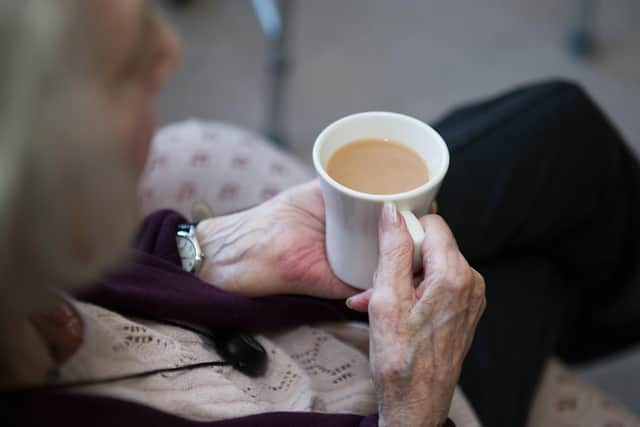Covid in care homes ‘is the worst failure of devolution’
Almost half (45 per cent) of the 3,213 Covid-19 Scottish deaths since the start of the outbreak have been in care homes and the report published by the Common Weal think tank today raises concerns over the weakness of the inspection and enforcement regime in Scotland.
The report comes amid mounting criticism of the Scottish Government’s handling of the coronavirus crisis, with First Minister Nicola Sturgeon suggesting yesterday that an independent inquiry could take place into mistakes that were made in dealing with an outbreak at a Nike conference in Edinburgh in February.
Advertisement
Hide AdAdvertisement
Hide AdIt finds that one quarter of Scotland’s care homes, those rated adequate or below, could have been “expected” to be unable to protect older people in the event of a pandemic.


Over the course of the crisis there have been ongoing concerns over testing levels and the provision of personal protective equipment (PPE) in the homes.
Today’s report was written by Nick Kempe, a former head of service for older people at Glasgow City Council.
It states: “The number of people dying as a result of Covid-19 in care homes in Scotland, both residents and staff, has been an unmitigated disaster.
“For a country focused on improving outcomes for its citizens, it is the worst possible health and social care outcome that anyone could ever have conceived of for older people.


“It possibly represents the single greatest failure of devolved government – and I use that term broadly to encompass successive Scottish Governments and different levels of government – since the creation of the Scottish Parliament.”
The Care Inspectorate has few “enforcement powers” and works inside a regulatory regime which is very limited in scope, the report finds. It points to the example of the tragedy of the Home Farm Care Home on Skye, where an outbreak has claimed ten lives, adding that the Care Inspectorate was incapable of bringing the establishment “up to the standard required” for the Covid crisis.
The mental wellbeing of residents was also not made a priority, with people being locked in rooms alone for indefinite periods as a result of Scottish Government advice. Many residents never saw their family again, the report adds.
Advertisement
Hide AdAdvertisement
Hide AdThe repeated updating of guidelines also created a “confusing” impact, according to the report. Between 10 May, when revised guidelines issued two days earlier were withdrawn, and 15 May, when new revised guidelines were issued, there were no official Scottish Government guidelines at all, the report states.
Mr Kempe said: “I hope the report shows that the thousand individual tragedies now being played out in Scotland’s care homes are no accident, but a consequence of the state abandoning responsibility for the welfare of its citizens.
“To redress the disaster we need not just guidance, but action from the Scottish Government. That will require significant additional resources aimed at protecting older people and the staff who work in care homes while respecting their rights.”
The report recommends that the Scottish Government lead the development of a national plan to protect older people in care homes from Covid-19 and future pandemics, building on the clinical guidance of 15 May. Contact tracing and testing in preventing the virus from entering care homes should be at the heart of this approach, with contact tracing teams working closely with Care Inspectorate, SSSC and staffing agencies.
As part of the development of the Covid-19 plan, the Scottish Government should also commission an independent short-term investigation into what lessons can be learned from outbreaks in care homes to date, the report states. This should include both care homes where outbreaks have been contained, those where it has spread rapidly, like Home Farm, and what there is to learn from countries that have successfully prevented outbreaks in residential settings.
Ministers are also being urged to use the Health and Care (Staffing) (Scotland) Act 2019 to ensure that the health skills of staff in nursing homes is sufficient to protect vulnerable older people.
The Care Inspectorate should also urgently identify all care homes where, like Home Farm, residents might be particularly at risk, which may apply to a third of all care homes in Scotland, the report says.
It adds that councils should also be given the financial resources, along with health boards, which would allow them to step in and take over failing services.
Advertisement
Hide AdAdvertisement
Hide AdCommon Weal director Robin McAlpine said: “This report makes painful reading. Of course mistakes would be made during this crisis, but the scale of the mistakes made should lead to an urgent inquiry and care home staff and residents and their families all deserve both answers and action.
“But the problem is more fundamental. Scotland’s care sector is almost all privatised and is run largely like a property speculation industry, which has minimised the more expensive medical services it provides.
“In combination with major mistakes, this has proved to be a lethal cocktail and Scotland should commit to returning care for older people to being a public service delivered for the public good.”
Health secretary Jeane Freeman announced this week that all care home staff would be routinely tested for Covid-19 as part of a drive to suppress the spread of the virus in the sector.
Ms Freeman told MSPs yesterday that guidance was first issued to care homes in March and has since been updated.
“Each iteration is a reflection of our growing understanding of the virus and of the situation on the ground in some of our care homes,” she added.
As demand for PPE soared globally, the NHS set up a hotline which would allow care homes to get in touch and request equipment such as masks and gowns, while order volumes were increased by ministers.
Ms Freeman said: “To make sure we could get the right PPE to the right people we created direct distribution routes, including local PPE hubs for social care providers.”
A message from the Editor:
Advertisement
Hide AdAdvertisement
Hide AdThank you for reading this story on our website. While I have your attention, I also have an important request to make of you.
With the coronavirus lockdown having a major impact on many of our advertisers - and consequently the revenue we receive - we are more reliant than ever on you taking out a digital subscription.
Subscribe to scotsman.com and enjoy unlimited access to Scottish news and information online and on our app. With a digital subscription, you can read more than 5 articles, see fewer ads, enjoy faster load times, and get access to exclusive newsletters and content. Visit https://www.scotsman.com/subscriptions now to sign up.
Our journalism costs money and we rely on advertising, print and digital revenues to help to support them. By supporting us, we are able to support you in providing trusted, fact-checked content for this website.
Joy Yates
Editorial Director
Comments
Want to join the conversation? Please or to comment on this article.